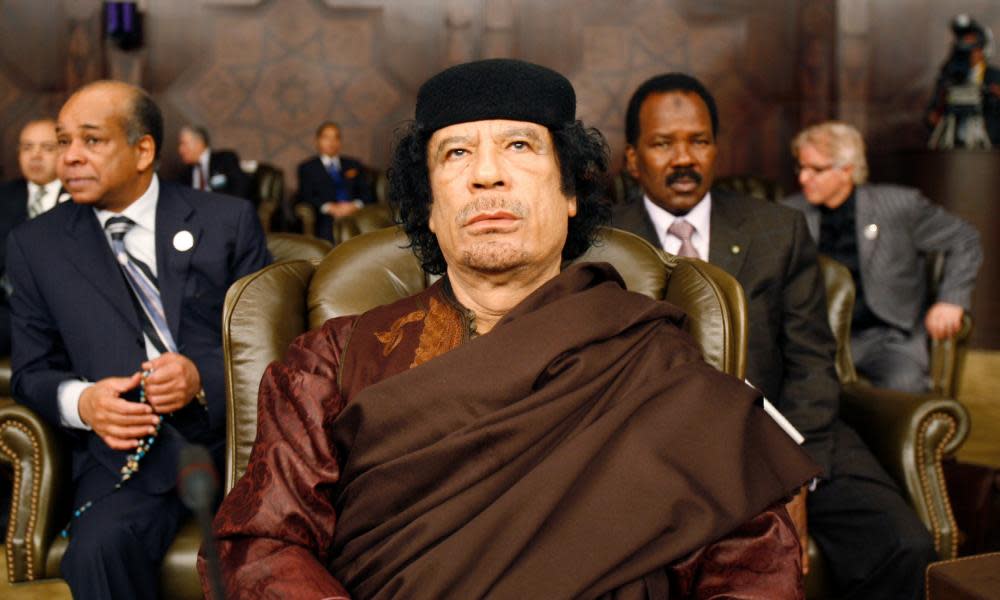The tangled web of foreign wars and terrorism | Letters

Paul Mason (G2, 27 May) is wrong to claim that the blowback theory is irrelevant in the case of the Manchester attack. Blowback theory is most definitely relevant. It is not confined to “blam[ing] Islamist terrorism directly on western expeditionary warfare”, as Mason incorrectly states. Islamic State germinated in the scorched earth left behind when we removed the regime of Saddam Hussein. If we had not invaded Iraq, the organisation that is now attacking us would not exist. That is blowback.
The plan proclaimed to stabilise Libya, after the overthrow of Gaddafi, was never going to work. There were realistic alternatives, put forward at the time, to bombing on the side of the rebels – such as setting up UN safe areas – but they were ignored. Nato turned a blind eye to shipments of weapons bound for Misrata, with the result that one big Gaddafi turned into lots of little Gaddafis. That is what has brought about the ungovernable space in Libya which Isis has exploited. That is blowback.
Now Trump has loosened the rules of engagement for US bombing, with the result that 50 civilians in Syria were killed in the week before the attack on Westminster, and 200 in Iraq the week before that – both in raids targeting Isis, with UK involvement and support. Unlike in Manchester, the Westminster attacker apparently had no organisational links with Isis – but that does not mean there is not an indirect connection. That, too, is blowback. Violence begets violence. Jeremy Corbyn is right, we need to find alternatives.
Associate Professor Jake Lynch
Chair, Department of Peace and Conflict Studies, University of Sydney
• Isn’t it time Theresa May was asked difficult questions about her role as home secretary when in 2011 the Home Office apparently lifted police control orders on scores of suspected Libyan terrorists living in Britain, so they could go and fight against the Libyan government of Colonel Gaddafi? These terrorists were known to belong to the Libyan Islamic Fighting Organisation, an al-Qaida affiliate. These terrorists may even have been trained by the SAS. After Gaddafi was overthrown, how many of these terrorists did the Home Office allow back into Britain?
Mark Holt
Liverpool
• Paul Mason cites the September 2016 foreign affairs committee report on the intervention in Libya. In reality the FAC report, quoting Libyan experts Professor George Joffe and Alison Pargeter, concluded: “Despite his rhetoric, the proposition that Muammar Gaddafi would have ordered the massacre of civilians in Benghazi was not supported by the available evidence.”
Ian Sinclair
London
• Andy Burnham is wrong when he says: “9/11 happened before any interventions overseas” (Report, 27 May). The 9/11 attackers in 2001 came mostly from Saudi Arabia because the holy places had been “desecrated” (in their eyes) by the stationing of US (“infidel”) troops there since the Iraq crisis of 1990-91. The Iraq crisis was the first large foreign intervention in the Arab peninsula since independence and added to the region’s instability. The Islamist ideology of al-Qaida, forged by the Saudi-financed mujahideen in the proxy Nato war against communist Afghanistan and its Soviet ally, spread and became more hardline in the years after the creation of the 1990 coalition to throw Iraq out of Kuwait and the subsequent 1991 Gulf war.
Ian Bourne
London
• The point Jeremy Corbyn is making is not that terrorism is the direct outcome of British involvement in foreign wars – which is what Theresa May is asserting and your editorial (27 May) appears to support. But that these military interventions have led to the creation of “huge ungoverned spaces” within which Isis has been able to establish itself and spread its poison to potential supporters.
Kevin McGrath
Harlow, Essex
• The overriding memory that comes to mind about the atrocity in Manchester are the cheers for Hilary Benn’s speech as the vote was passed for military action in Syria. There are no excuses for the violence we have witnessed, but when will we learn that the only way to combat this violence is through peace efforts and not retaliation? Our politicians must begin to search for a peaceful solution for all of these battles we have involved ourselves in. Jeremy Corbyn is right to bring up this question now; and our representatives and the public need to consider this question and our future actions now.
Mike Swanwick
Nottingham
• Why does Jonathan Freedland (It’s a delusion to think this is all about our foreign policy, 27 May) rail so strenuously against a simplistic proposition of his own invention? No one is putting forward such an argument. The actual delusion actively being promoted today is that the current state of affairs has nothing to do with our foreign policy. To expose that delusion, of course, would be to support the grown-up stance taken by Jeremy Corbyn. Perhaps that answers my initial question.
Julian Edge
Manchester
• Besides being an excellent analysis of the links between terrorism and foreign policy, Jonathan Freedland’s opinion piece contained a eloquent imagining of how the losses in the Manchester bombing are affecting their families. This was outstanding writing: simple and moving when much journalism attempting to address these issues has been well-meaning but portentous.
GP Hyde
Grimsby, Lincolnshire
• Join the debate – email guardian.letters@theguardian.com
• Read more Guardian letters – click here to visit gu.com/letters

 Yahoo News
Yahoo News 
